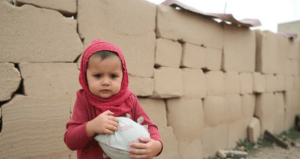Gaza’s Hunger Crisis: 5 Shocking Facts About the Blockade & Starvation
Gaza is on the brink of a humanitarian disaster as bakeries are set to run out of flour within days, and food supplies are nearly depleted. The Israeli blockade, now in its fourth week, has completely halted the entry of essential goods, leaving over two million Palestinians struggling with hunger, especially during the normally joyous Eid al-Fitr. Aid organizations warn that severe malnutrition will surge as local food production has been destroyed, making Gaza entirely dependent on external assistance.
Prices for scarce food items have skyrocketed, with onions costing $14 per kilogram and cooking gas becoming 30 times more expensive, forcing families to cook over open fires. Humanitarian workers are unable to deliver aid safely due to ongoing Israeli airstrikes, leading to the suspension of critical programs like water deliveries and child nutrition support. The U.N. has halved food rations to stretch supplies, but once flour runs out, bread production—one of Gaza’s last remaining food sources—will cease.
Despite global outcry, Israel has shown no signs of lifting the siege, claiming aid is being diverted to Hamas while rights groups warn of a “starvation policy” that could constitute a war crime. As desperation grows, aid workers fear that no level of suffering will be enough for the world to take action.

Gaza’s Hunger Crisis: 5 Shocking Facts About the Blockade & Starvation
The humanitarian crisis in Gaza has reached catastrophic levels as essential supplies dwindle under a prolonged Israeli blockade. According to the United Nations, bakeries in Gaza could run out of flour within days, leaving over two million Palestinians at risk of severe hunger. Families now receive only half their usual food rations, markets are barren, and aid workers face immense challenges delivering assistance amid relentless airstrikes.
Food and Fuel Shortages Push Gaza to the Brink
For four weeks, Israel has blocked all food, fuel, medicine, and critical supplies from entering Gaza, worsening an already dire situation. This marks the longest such blockade in Israel’s conflict with Hamas, with no signs of relief. Even during Eid al-Fitr, a holiday traditionally celebrated with feasts, many families faced empty plates. Aid groups warn that malnutrition and starvation could spiral if the siege continues. With local food production destroyed by war, Gaza is entirely dependent on external aid—now nearly exhausted.
Shorouq Shamlakh, a mother of three in northern Gaza, relies on monthly U.N. food parcels. She stretches each ration as long as possible but fears her family will starve if distributions stop. The World Food Program (WFP) estimates that flour stocks for bakeries will be depleted by Tuesday, while general food supplies may last only two more weeks. As a last resort, the WFP has emergency biscuits for 415,000 people. Fuel and medical supplies are also critically low, forcing hospitals to ration antibiotics and painkillers. Aid organizations must prioritize the limited fuel between trucks, bakeries, water pumps, and hospitals—an impossible choice.
“Everything is essential, and we don’t have enough,” said Clémence Lagouardat of Oxfam International.
Safety Risks Halt Aid Efforts
Israeli military operations, escalating since March 18, have displaced thousands and killed hundreds, including women and children, according to Palestinian health officials. Airstrikes have hit humanitarian sites, and aid groups cannot operate safely without a system to notify the military of their movements. As a result, programs providing clean water, child nutrition, and medical care have come to a halt.
Soaring Prices and Empty Markets
During a brief ceasefire in January and February, agencies were able to deliver significant aid. But since Israel tightened restrictions on March 2, no food or goods have entered Gaza. Prices for staples like onions ($14/kg) and tomatoes ($6/kg) have skyrocketed. Cooking gas now costs 30 times more than usual, forcing families to cook over open flames. Meat, dairy, and fresh produce have all but disappeared.
“Famine has already begun,” said Abeer al-Aker, a teacher and mother in Gaza City.
Families Depend on Shrinking Aid
With markets empty, families rely on U.N. food parcels containing rice, lentils, canned fish, and powdered milk—far from sufficient. Rema Megat, a recipient in Jabaliya, explained, “This single kilo of rice will be finished in one meal.” To stretch resources, the U.N. has halved individual rations and shifted supplies to communal kitchens and bakeries. These now serve 940,000 daily meals, but stocks are rapidly depleting.
The Gaza Soup Kitchen, once a major provider, has run out of meat and vegetables, serving only rice with canned goods. “Fights break out over food,” said co-founder Hani Almadhoun.
No End in Sight
Unlike past conflicts, international pressure—including from the U.S.—has not pushed Israel to ease restrictions. Human rights groups condemn the blockade as a “starvation policy” and a potential war crime. Israel denies this, claiming Hamas diverts aid and asserting that it complies with international law. Foreign Minister Gideon Saar pointed to aid delivered during the ceasefire as evidence that Gaza still has resources, but he offered no timeline for reopening the borders.
Malnutrition and Collapsing Healthcare
Malnutrition is worsening, particularly among children. Save the Children has paused treatment programs for undernourished infants, leaving thousands at risk. Weak children are more vulnerable to diseases like pneumonia, while overwhelmed hospitals prioritize war injuries, lacking capacity to treat malnutrition cases.
Aid workers express despair. “The world has lost its moral compass,” said Sam Rose of UNRWA. “No amount of suffering seems enough to make it stop.”
As Gaza’s crisis deepens, the international community faces urgent calls to intervene before starvation claims more lives.
You must be logged in to post a comment.